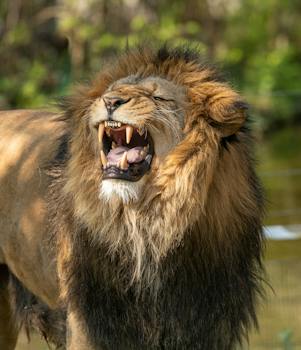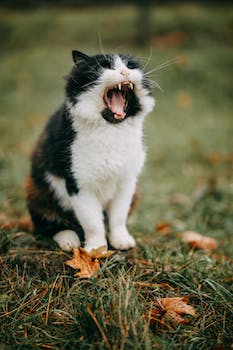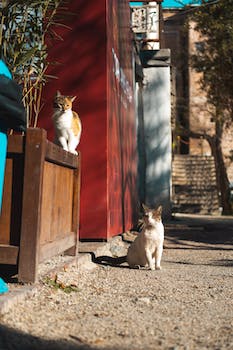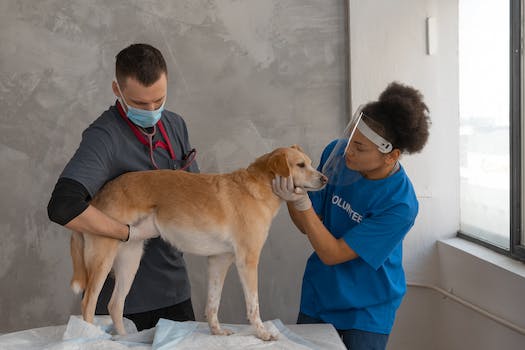

-
Table of Contents
"Unleashing the Power of Feline Connections: Discover the True Bonds Between Cats."
Introduction
Cats are known for their independent nature, but many cat owners have observed their pets forming strong bonds with other cats. This raises the question: are cats truly capable of forming strong bonds with other cats? In this article, we will explore the evidence and behaviors that suggest cats can indeed develop deep connections with their feline companions.
The Social Dynamics of Cats: Understanding their Bonding Abilities with Other Cats
Are Cats Truly Capable of Forming Strong Bonds with Other Cats?
Cats are often seen as independent and solitary creatures, but many cat owners have witnessed their pets forming strong bonds with other cats. While it is true that cats have a reputation for being aloof, they are also social animals that can form deep connections with their feline companions. Understanding the social dynamics of cats and their bonding abilities with other cats can shed light on this intriguing aspect of their behavior.
Cats are known for their territorial nature, and this territoriality plays a significant role in their social interactions. When cats live in the same household, they establish territories within the shared space. These territories serve as a way for cats to define their personal space and establish boundaries with other cats. However, within these territories, cats can also form social bonds.
One of the ways cats bond with each other is through mutual grooming. Grooming is an essential part of a cat's daily routine, and when cats groom each other, it is a sign of trust and affection. Mutual grooming helps cats establish a sense of familiarity and belonging within their social group. It also helps to strengthen the bond between cats and reduce tension or aggression.
Another way cats form bonds with each other is through play. Play behavior is not only a way for cats to exercise and have fun but also a means of social interaction. When cats engage in play together, they are building trust and establishing a positive association with each other. Play can also help cats release pent-up energy and reduce stress, contributing to a harmonious social environment.
Cats also communicate with each other through body language and vocalizations. By observing and responding to these signals, cats can establish social hierarchies and maintain peaceful relationships. For example, a dominant cat may use a low growl or a raised tail to assert its authority, while a submissive cat may respond with a lowered body posture or averted gaze. Understanding and respecting these communication cues is crucial for cats to form and maintain strong bonds with each other.
While cats can form strong bonds with other cats, it is important to note that not all cats will get along. Just like humans, cats have unique personalities and preferences. Some cats may be more sociable and enjoy the company of other cats, while others may prefer to be the sole feline in the household. Introducing cats to each other gradually and providing them with separate resources, such as food bowls and litter boxes, can help minimize conflicts and increase the chances of successful bonding.
In conclusion, cats are indeed capable of forming strong bonds with other cats. Despite their independent nature, cats are social animals that rely on social interactions for their well-being. Through mutual grooming, play, and communication, cats establish trust, familiarity, and a sense of belonging within their social group. However, it is important to remember that not all cats will get along, and careful introductions and respect for individual preferences are necessary for successful bonding. Understanding the social dynamics of cats and their bonding abilities with other cats can help cat owners create a harmonious and enriching environment for their feline companions.
Exploring the Science Behind Cat Relationships: Can Cats Truly Form Strong Bonds?

Are Cats Truly Capable of Forming Strong Bonds with Other Cats?
Cats have long been known for their independent and solitary nature. They are often seen as aloof creatures who prefer to keep to themselves. However, recent studies have shown that cats are not as solitary as we once believed. In fact, cats are capable of forming strong bonds with other cats, and these relationships can have a significant impact on their overall well-being.
One of the key factors in cat relationships is socialization. Cats that are properly socialized from a young age are more likely to form strong bonds with other cats. Socialization involves exposing kittens to various experiences, including interactions with other cats. This helps them develop the necessary social skills to navigate relationships with their feline counterparts.
But what exactly does a strong bond between cats look like? It can manifest in various ways. For example, bonded cats may engage in mutual grooming, where they groom each other's fur. This behavior not only helps keep their coats clean but also strengthens their bond through physical contact. Cats that are bonded may also engage in play together, chasing each other and pouncing on toys. This playful interaction is not only fun for the cats but also serves as a way to strengthen their bond.
Another important aspect of cat relationships is scent. Cats have a highly developed sense of smell, and they use scent to communicate with each other. When cats rub against each other, they are not only marking each other with their scent but also exchanging information. This scent exchange helps cats recognize each other as familiar and can contribute to the formation of strong bonds.
Interestingly, cats that are raised together from a young age are more likely to form strong bonds. This is because they have had the opportunity to develop a sense of familiarity and trust with each other. However, even cats that are introduced to each other later in life can form strong bonds if given the chance. It may take some time for them to adjust to each other's presence and establish a bond, but with patience and proper introductions, it is possible.
The benefits of strong cat relationships extend beyond companionship. Cats that have bonded with each other are often more confident and less stressed. They have a built-in support system that provides comfort and security. This can be particularly beneficial in multi-cat households, where cats may face competition for resources. Bonded cats are more likely to share resources and engage in cooperative behaviors, reducing the likelihood of conflict.
In conclusion, cats are indeed capable of forming strong bonds with other cats. Socialization, mutual grooming, play, and scent exchange all play a role in the development of these relationships. Whether cats are raised together from a young age or introduced later in life, given the opportunity, they can form strong bonds that contribute to their overall well-being. So, the next time you see your cats cuddling or grooming each other, know that they are not just being aloof, but rather, they are strengthening their bond and enriching their lives.
Unveiling the Truth: Debunking Myths about Cats' Social Behavior and Bonding with Other Cats
Are Cats Truly Capable of Forming Strong Bonds with Other Cats?
When it comes to cats, there are many misconceptions about their social behavior and ability to form strong bonds with other cats. Some people believe that cats are solitary creatures who prefer to be alone, while others think that cats are only capable of forming strong bonds with humans. However, the truth is that cats are indeed social animals who can form deep and meaningful relationships with other cats.
Contrary to popular belief, cats are not solitary animals by nature. In fact, they are social creatures who have a natural inclination to form social bonds with other cats. While it is true that cats are more independent compared to dogs, they still have a strong need for social interaction. Cats have a complex social structure that involves communication, cooperation, and even grooming rituals.
One of the ways cats form bonds with each other is through mutual grooming. Grooming is not only a way for cats to keep themselves clean, but it also serves as a bonding activity. When cats groom each other, they are not only removing dirt and parasites from their fur, but they are also strengthening their social bond. This behavior is often seen in cats that live together in the same household or in feral cat colonies.
Another way cats form bonds with each other is through play. Play behavior is not only a way for cats to exercise and release energy, but it also helps them establish and maintain social relationships. Cats engage in play fighting, chasing, and wrestling with each other, which helps them develop trust and communication skills. Play behavior is particularly important for kittens, as it helps them learn social skills and boundaries.
Cats also communicate with each other through body language and vocalizations. They use their tails, ears, and facial expressions to convey their emotions and intentions. By observing and responding to these signals, cats are able to establish and maintain social bonds. For example, a cat may approach another cat with a relaxed body posture and a slow blink, indicating that they are friendly and non-threatening.
While cats can form strong bonds with other cats, it is important to note that not all cats will get along with each other. Just like humans, cats have their own unique personalities and preferences. Some cats may be more social and outgoing, while others may be more reserved and independent. It is crucial to introduce cats to each other gradually and provide them with their own space and resources to avoid conflicts and ensure a harmonious coexistence.
In conclusion, cats are indeed capable of forming strong bonds with other cats. They are social animals who engage in grooming, play, and communication to establish and maintain social relationships. While not all cats will get along with each other, it is important to understand and respect their individual personalities and preferences. By providing cats with the opportunity for social interaction and a harmonious living environment, we can help them thrive and enjoy fulfilling relationships with their feline companions.
Q&A
1. Are cats capable of forming strong bonds with other cats?
Yes, cats are capable of forming strong bonds with other cats.
2. What factors contribute to cats forming strong bonds with other cats?
Factors that contribute to cats forming strong bonds with other cats include socialization, compatibility, and shared experiences.
3. Can cats form stronger bonds with other cats than with humans?
It varies from cat to cat, but some cats may form stronger bonds with other cats than with humans.
Conclusion
In conclusion, cats are indeed capable of forming strong bonds with other cats.












